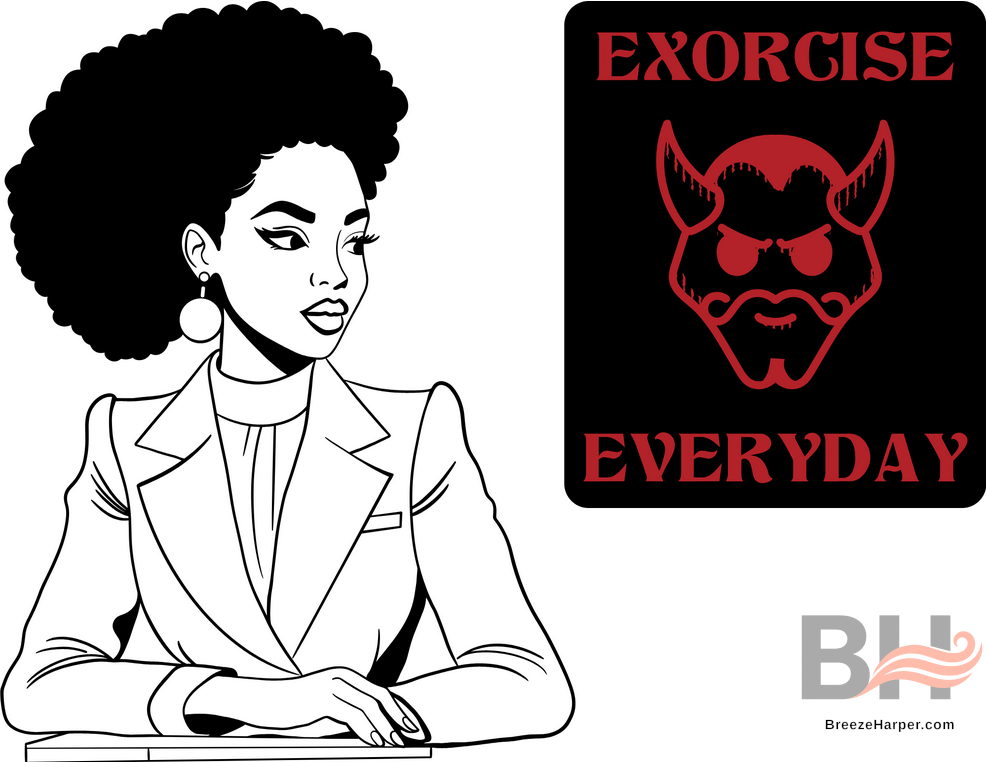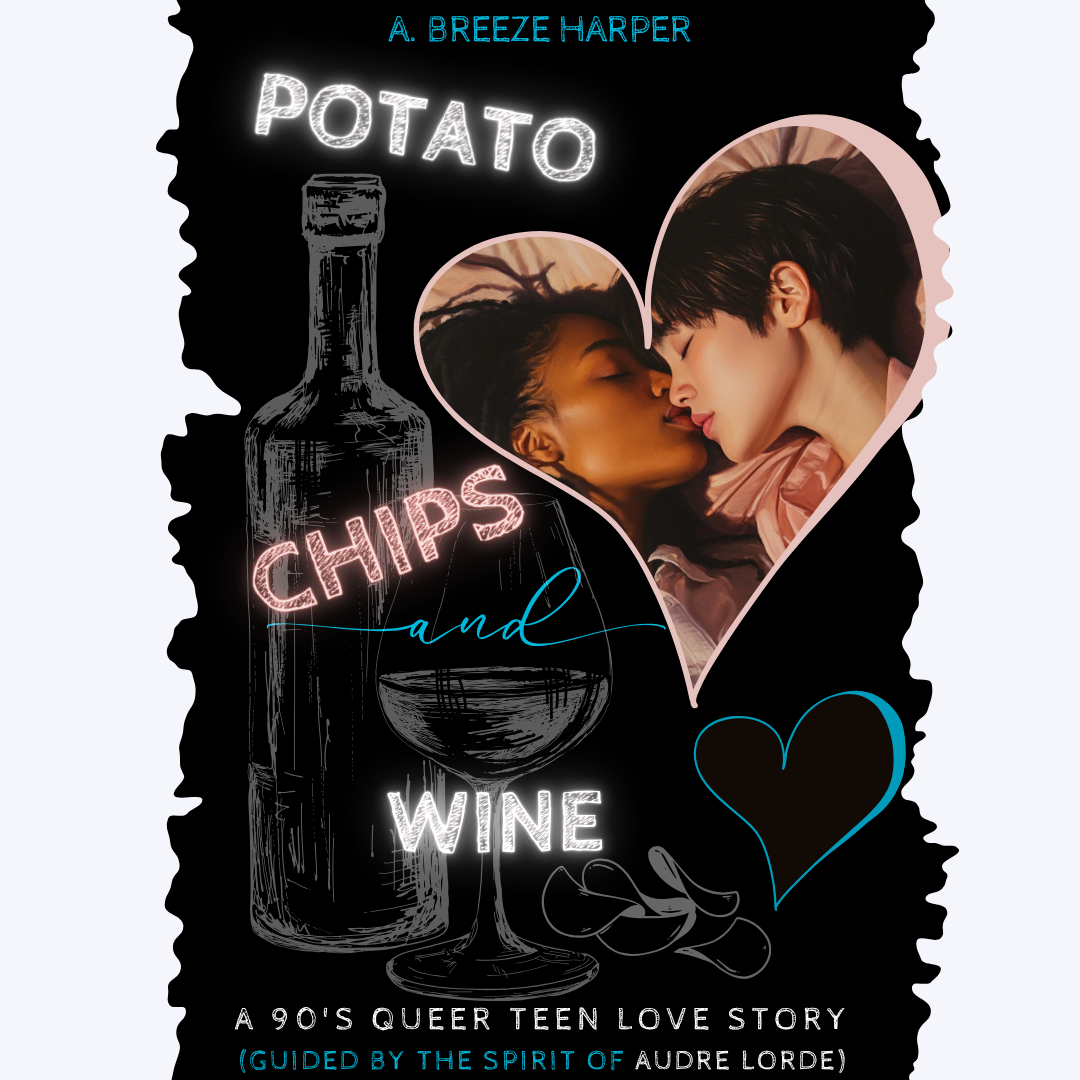Fighting the Demon of Colonization Within: A Testimony of Survival, Spirit, and the Sacred Reclamation of Self

There comes a time when the weight of silence becomes unbearable. When your own body, soaked in years of trauma, grief, erasure, and survival, begins to hum with the static of ancestral truth trying to break through. This is not just a personal reckoning. This is a collective remembering.
For those of us born into Black bodies, queer spirits, neurodivergent minds, and femme-presenting forms — the world has always been a battlefield. And we weren’t handed swords. We were handed shame, compliance, Christian guilt, and the burden of other people's fear. From the moment we enter the world, we are baptized not in unconditional love, but in expectations laced with punishment.
Colonization doesn’t need the colonizer to remain present. It lives on as an internalized panopticon. A surveillance state in our spirits. A little demon inside us, programmed by generations of spiritual violence, whispering:
"Don't get too loud.
Don't get too queer.
Don’t ask for too much.
Don’t live too free."
This little demon —and make no mistake, it is alive — is not some abstract concept. It is a sentient, suffering part of us. A protector-turned-warden. A deeply traumatized part of our psyche that holds onto the only life it knows: the life of control, fear, submission. Because for it, the devil it knows is safer than the liberation it doesn’t understand.
It clings to the familiar chains because freedom feels like death to the parts of us that have only ever known survival. It doesn’t want to die — not because it’s evil — but because it was born of pain. And pain, too, wants to live. It has become so enmeshed in our identity that the thought of letting it go feels like letting go of ourselves.
I have spent a lifetime punished for refusing binaries. For not fitting into the narrow molds handed to me by schoolteachers, family, lovers, employers, and entire institutions that were too scared to meet me in my full truth. I am a queer, pansexual, decolonial, autistic Black woman. And because I wouldn't shrink, they tried to crush me.
A former intimate partner punished my joy with his cutting words and unforgiving kicks, slaps, and punches. White teachers and Dartmouth professors punished my brilliance because it didn’t mimic theirs. And the workplace? The workplace rewarded my silence and punished my presence. Again and again.
But the truth? They weren’t reacting to me. They were reacting to the threat of someone who remembered who she was in a world built to make her forget.
This is what happens when you start killing the colonizer within. When you start recognizing that your trauma is somatic. That the grief in your body is not just from your lifetime, but from the memory of generations never allowed to cry.
You begin to see that the demon inside you isn't evil. It's scared. Scared of being replaced by something unfamiliar: freedom.
Because freedom requires a death. Not your death. But the death of the fractured self that made itself small to survive. The death of the voice that said, "just swallow it and smile." The death of the lie that said suffering equals virtue.
And here's the thing: I am traumatized as hell. I’m not above it. I’m not some healed, whole oracle on a mountaintop. I am still figuring out how to stop reenacting harm. Still learning how to hold the complexity of my pain without projecting it. I’m still navigating how to trust joy. How to feel safe in softness. How to be seen without armoring up.
But I know this: my fight is sacred. And so is yours.
Because most people don’t even know they’re still haunted. Still walking around inside someone else's script. Still performing versions of themselves designed to be palatable, obedient, invisible.
America never went through reparative justice. No national reckoning. No collective grief ritual. No reconciliation after slavery, after Jim Crow, after genocide.
So what we’re left with is a nation of walking trauma, dressed in patriotism, religiosity, and silence. A country where people hurt each other while crying about how hurt they are. A nation so disassociated from its own soul that it mistakes control for love, conformity for safety, punishment for righteousness.
We are a haunted people. But some of us are exorcising... and not alone, but with like-spirited community; this is village work.
And when we enter that space of freedom, we stop pointing fingers outward only. We start naming the ghosts inside. The internalized colonizer. The inner punisher. The inherited scripts. The protector parts we needed to survive, but must now lovingly lay to rest.
To survive as a queer Black autistic woman, I had to compartmentalize. To code-switch. To mask. To shrink. To tolerate. To smile when I wanted to scream. To parent while holding a lifetime of unprocessed grief.
But now? Now I am unmasking. Uncolonizing. Unlearning.
I am done surviving. I am ready to thrive.
And I offer this essay not as closure, but as a call. A call to anyone who has felt like they were too much. Too queer. Too neurodivergent. Too Black. Too soft. Too angry. Too different.
You were never too much. You were remembering something the world asked you to forget.
Keep going. You are the living proof that the demon of colonization can be faced. Can be transmuted. Can be unlearned.
Your soul is older than oppression. And your freedom is the revolution.
Why I Write: Introducing Potato Chips and Wine
Writing, for me, is an erotic act in the way Audre Lorde defined the erotic: a power rooted in deep knowing, in joy that transcends fear, in the sacred wholeness of being. I do not write to entertain. I write to remember (and to remind others) that we are not here to shrink into compliance. We are here to live as poetry.
My novel Potato Chips and Wine is a living testament to that. It is a vessel of memory, rage, and ecstatic reclamation. Pearl, the queer Black girl at its center, is not just a character: she is the invocation of every spirit who dared to feel joy in a world that punished her for it. She is the embodiment of the erotic as liberation : navigating grief, terror, desire, and imagination in a small white town determined to erase her.
Pearl’s fight isn’t just against external systems. Her fight is with the demon inside ; the part of her taught to fear her own power, her own pleasure, her own possibility. And still, she chooses life. She chooses herself.

Potato Chips and Wine is the story of that choice — raw, radiant, and unapologetic. It does not center whiteness. It does not ask permission. It is written in the blood and breath of those who were told they were too much.
Pearl doesn’t just survive....she reclaims. She remembers. And through her, so do we.
I invite you to read it; not as fiction, but as spellwork. As a guide. As a mirror. As a map back to the erotic truth that colonization tried to bury in us all.
Because when we touch that truth, we become free.
In honor of every survivor who became their own healer, every silenced soul who learned to speak in fire, and every one of us who dares to remember who we really are.
If you found this post meaningful, subscribe or share to help others connect and support the work that's yet to come.
Follow on social media: https://linktr.ee/drbreezeharper
